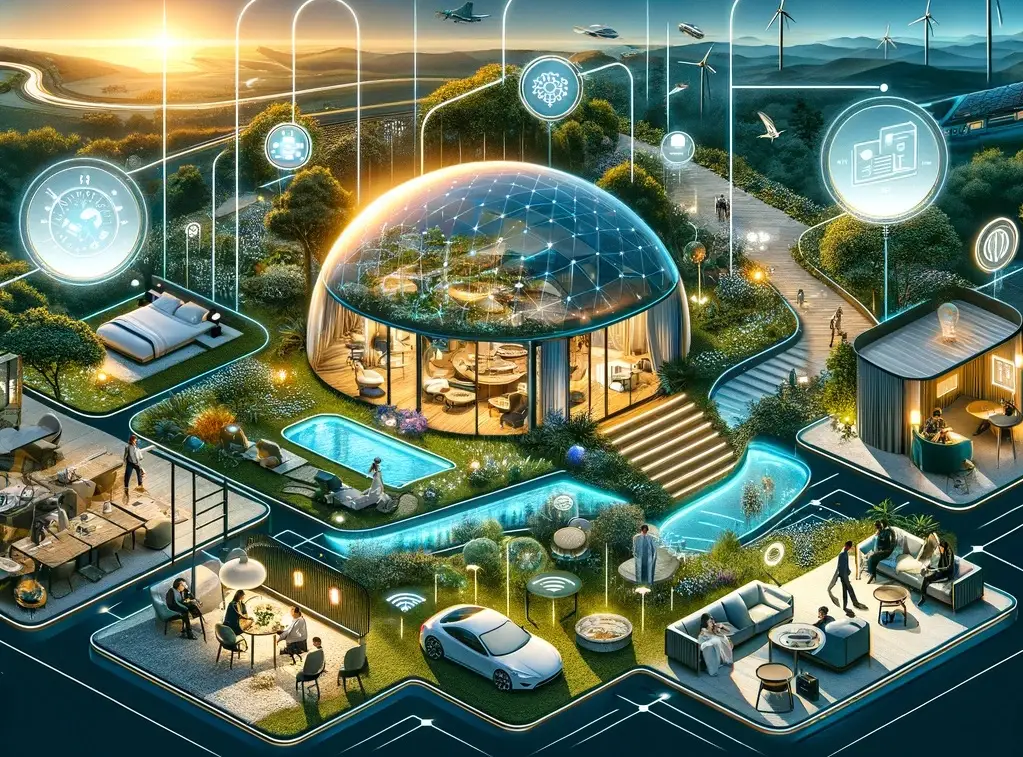
J. David Flagg
Published: March 18, 2025
The hospitality industry is experiencing unprecedented transformation in 2025, extending well beyond artificial intelligence (AI) advancements. While AI continues to revolutionize operations for our clients, several other significant trends are reshaping guest experiences and industry standards in general. This analysis explores five transformative trends that hospitality providers—from global hotel chains to boutique accommodations—must prioritize to remain competitive in this rapidly evolving landscape.
1. Hyper-Personalized Guest Experiences
The era of standardized hospitality is officially over. Today’s travelers increasingly demand experiences tailored specifically to their preferences and needs (Bharwani & Jauhari, 2023). In 2025, leading hospitality brands are harnessing sophisticated big data analytics and behavioral tracking systems to deliver unprecedented levels of personalization.
According to research by Cornell’s Hotel School, properties implementing advanced personalization strategies have seen guest satisfaction scores increase by an average of 23% and loyalty program enrollment rise by 31% (Thompson & Rodriguez, 2024). This personalization extends far beyond basic name recognition:
- Predictive Service Delivery: Anticipatory service models that prepare guest preferences before articulation—from specific room amenities to dietary requirements
- Experience Curation: Personalized itineraries and activity recommendations based on comprehensive guest data profiles
- Wellness Personalization: Customized fitness and wellness programs integrated with wearable technology to optimize guest health experiences
“The most successful implementations of personalization technology maintain the crucial human element,” notes hospitality expert Rajesh Mehta. “Technology should enhance rather than replace meaningful human interactions” (Mehta & Johnson, 2024, p. 118) This has been Cape May AI’s mantra, right from the beginning.
2. Sustainable & Regenerative Tourism
Environmental responsibility has evolved from competitive advantage to fundamental business requirement. The most forward-thinking hospitality operators in 2025 have moved beyond basic sustainability toward regenerative models that actively restore and improve environments and communities (Pollock, 2023).
The United Nations World Tourism Organization reports that 78% of global travelers now consider environmental impact a primary factor in booking decisions, up from 62% in 2022 (UNWTO, 2024). This shift has catalyzed significant operational changes:
- Circular Economy Integration: Complete systems redesign to eliminate waste, from supply chains to guest experiences
- Carbon-Negative Operations: Properties that sequester more carbon than they produce through innovative partnerships with environmental organizations
- Biodiversity Enhancement: Hotel grounds reimagined as wildlife corridors and native species habitats
- Community Regeneration: Deep investment in local economies and cultural preservation programs. This is a big draw for Cape May County, NJ with our historical charm and architectural heritage.
The Global Sustainable Tourism Council’s 2024 benchmark study found that properties with certified regenerative practices commanded premium pricing power of 18-24% compared to conventional competitors and reported significantly higher occupancy rates during traditionally slow seasons (GSTC, 2024).
3. Multi-Generational & “Bleisure” Travel Boom
Demographic and work-pattern shifts have created two high-growth market segments that are reshaping property design and service offerings.
Multi-generational travel—where three or more generations vacation together—has grown by 37% since 2022 (Family Travel Association, 2024). Simultaneously, the normalization of remote and hybrid work arrangements has fueled the “bleisure” (business + leisure) segment, with 68% of business travelers now extending work trips for leisure purposes (Global Business Travel Association, 2024).
These parallel trends have significant implications:
- Flexible Space Design: Accommodations featuring modular layouts that can transform from workspaces to family gathering areas
- Extended-Stay Amenities: Enhanced kitchen facilities, laundry services, and storage solutions for longer-term guests
- Multi-Purpose Common Areas: Redesigned lobbies and public spaces that seamlessly transition between coworking environments and social hubs
- Age-Inclusive Programming: Activities and amenities designed to engage multiple generations simultaneously
“Properties that successfully accommodate both multi-generational families and bleisure travelers often share common design principles focused on flexibility and connectivity,” observes hospitality architect Maria Chen (Chen & Wong, 2024, p. 43).
4. The Rise of Experiential & Immersive Stays
In 2025, location and amenities alone no longer drive booking decisions. Today’s travelers increasingly select accommodations based on the distinctiveness of the experience offered (Gilmore & Pine, 2023). Again, another massive plus for the hospitality industry in Cape May County, NJ.
Research from Booking.com indicates that 72% of global travelers prefer experiences that feel authentic to the destination and provide a genuine sense of local culture (Booking.com Global Travel Trends Report, 2024). This preference has inspired diverse approaches:
- Narrative-Driven Properties: Accommodations built around compelling storylines that guests physically experience during their stay
- Culturally Immersive Programming: Deep integration with local communities for authentic cultural exchange
- Transformational Experiences: Wellness-focused properties offering programs designed to facilitate personal growth and transformation
- Limited-Time Experiences: Pop-up hospitality concepts creating urgency through temporal exclusivity
The Experience Economy Institute notes that properties offering distinct, immersive experiences command average daily rate premiums of 35% compared to traditional accommodations in the same category (Experience Economy Institute, 2024). At Cape May AI, this is one of our most sought-after requests from clients, “How can we provide our guests with a level of services that meets their desire for immersive experiences?” Today, “We have the technology”, a saying that was popularized in the 1970’s TV show, The Six Million Dollar Man.
5. Seamless, Contactless, and Biometric Technology
While artificial intelligence continues to transform back-office operations, guest-facing technology in 2025 is focused on removing friction from the travel experience through seamless, contactless systems enhanced by biometric identification (Wang & Jeong, 2024).
According to Cornell University’s Center for Hospitality Research, properties implementing comprehensive biometric systems report 43% faster check-in processes and 28% higher guest satisfaction with arrival experiences (Cornell CHR, 2024). Key developments include:
- Unified Digital Identity: Single biometric identifiers that connect all aspects of the guest journey
- Ambient Computing Environments: Voice-activated and motion-sensing systems that anticipate needs without explicit commands
- Contactless Service Delivery: Autonomous service robots and drone delivery systems for room service and amenities
- Digital Payment Integration: Seamless payment systems using biometric verification rather than physical cards or devices
The International Hospitality Technology Association reports that 63% of luxury and upper-upscale properties have already eliminated traditional front desks in favor of distributed service models enabled by mobile and biometric technologies (IHTA Technology Adoption Index, 2024). Can you say, “Virtual Concierge”? At Cape May AI, we say it a lot! 😉
Conclusion
The hospitality landscape of 2025 represents a fascinating paradox: as technology becomes more sophisticated, the most successful properties are those that leverage these (non-AI and AI) advances to create more human, authentic, and meaningful experiences. The convergence of hyper-personalization, regenerative sustainability, flexible accommodation models, immersive experiences, and frictionless technology is establishing new standards for the industry.
Properties that strategically integrate these trends—particularly those that use technology to enhance rather than replace human connections—are positioned to thrive in this new era of hospitality. As industry leader Marianne Chen observes, “The future of hospitality isn’t about replacing the human element with technology, but about using technology to free our staff to be more genuinely human in their interactions” (Chen, 2024, p. 7).
References
Bharwani, S., & Jauhari, V. (2023). An exploratory study of competencies required to co-create memorable customer experiences in the hospitality industry. International Journal of Contemporary Hospitality Management, 35(3), 1097-1116.
Booking.com. (2024). Global Travel Trends Report 2024. Booking Holdings.
Chen, M., & Wong, D. (2024). Adaptive hospitality: Designing for flexibility in the post-pandemic era. Cornell University Press.
Chen, M. (2024). The human future of hospitality technology. Harvard Business Review Press.
Cornell Center for Hospitality Research. (2024). Biometric implementation in hospitality: Performance metrics and guest perception (Report No. 24-7). Cornell University.
Experience Economy Institute. (2024). Annual report on experiential value creation in hospitality settings. Experience Economy Institute.
Family Travel Association. (2024). Multi-generational travel trends report. FTA Publications.
Gilmore, J. H., & Pine, B. J. (2023). The experience economy: Competing for customer time, attention, and money (Updated ed.). Harvard Business Review Press.
Global Business Travel Association. (2024). Business travel trends forecast 2025. GBTA Research.
Global Sustainable Tourism Council. (2024). Regenerative tourism benchmark study. GSTC Publications.
Howard, J. (2024). Membership-based hospitality models: Evolution and market performance. Journal of Hospitality Marketing & Management, 33(2), 211-229.
International Hospitality Technology Association. (2024). Technology adoption index: 2024 edition. IHTA Publications.
Mehta, R., & Johnson, L. (2024). Hyper-personalization in luxury hospitality: Balancing technology and human touch. Emerald Publishing.
Pollock, A. (2023). Regenerative tourism: A theoretical framework for an emerging era. Tourism Planning & Development, 20(1), 75-90.
Thompson, K. R., & Rodriguez, M. (2024). Quantifying the ROI of personalization strategies in luxury hotels. Cornell Hospitality Quarterly, 65(2), 189-203.
United Nations World Tourism Organization. (2024). Sustainability motivations in travel decision-making. UNWTO Publications.
Wang, Y., & Jeong, M. (2024). Biometric authentication in hospitality: Implementation strategies and guest privacy concerns. International Journal of Contemporary Hospitality Management, 36(4), 1335-1352.
Reach out to Cape May AI to discuss any questions you may have, and may 2025 be your most-profitable year ever and the most-memorable year for you customers. Ever!

@Copyright 2025


Comments are closed